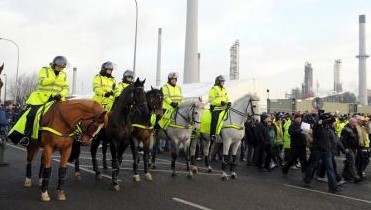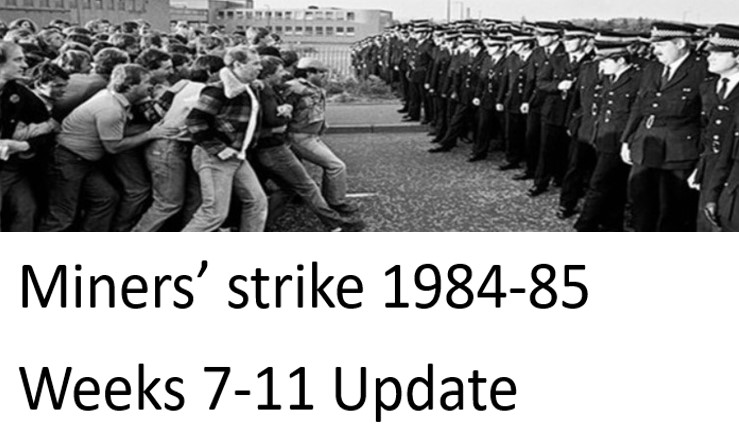Ray Goodspeed (Leyton and Wanstead CLP)
In the last couple of weeks, the government has suffered a series of embarrassing defeats in the House of Lords for their “Police, Crime, Sentencing and Courts Bill” (PCSC Bill). This is a welcome development but there is no room for complacency, as the main provisions of the bill remain and the government will seek any chance to take back the democratic rights of ordinary people to protest and resist the attacks that the ruling class are planning to unleash in the next few years.
The elements of the liberal establishment that are represented in the Lords found some of the clauses too much even for them to swallow and voted them down. Even Starmer’s Labour Party felt compelled to resist such authoritarian measures. Clearly, the widespread protests and lobbying against the bill have had some effect in stiffening their Lordships’ resolve. Of course, socialists have nothing but disdain for the House of Lords and we call for its complete abolition. It is a weapon in the hands of the ruling class that will be used to thwart any attempt to introduce socialist measures in the future.
It is an indication of the chaotic incompetence of the government just now that many of the changes that the Lords have rejected cannot simply be reversed in the Commons, as they were rushed, ill-thought-out “add-ons” introduced in the Lords’ stage, rather than the Commons and as such cannot go back and forth in the usual “ping-pong” game. However, a new bill could be introduced as early as April in the Commons, to try to force through all the most extreme clauses that have just been rejected.
Draconian
The main proposals are still absolutely draconian. They would allow a senior police officer to impose any conditions they consider necessary to prevent “disorder, damage, disruption, impact or intimidation”. Such a clause would make a nonsense of any protest, other than ones presumably designed NOT to make an impact!
The Home secretary would be given powers to make regulations to define the meaning of “serious disruption to the activities of an organisation which are carried on in the vicinity” or “serious disruption to the life of the community” and ban or restrict the protest accordingly. New penalties for criminal damage to a statue raise the maximum sentence from three months to 10 years. It also gives powers to the police to make subjective judgements about any behaviour which might fall foul of these vague provisions. Any we all know how sympathetic the police usually are to the rights of demonstrators!
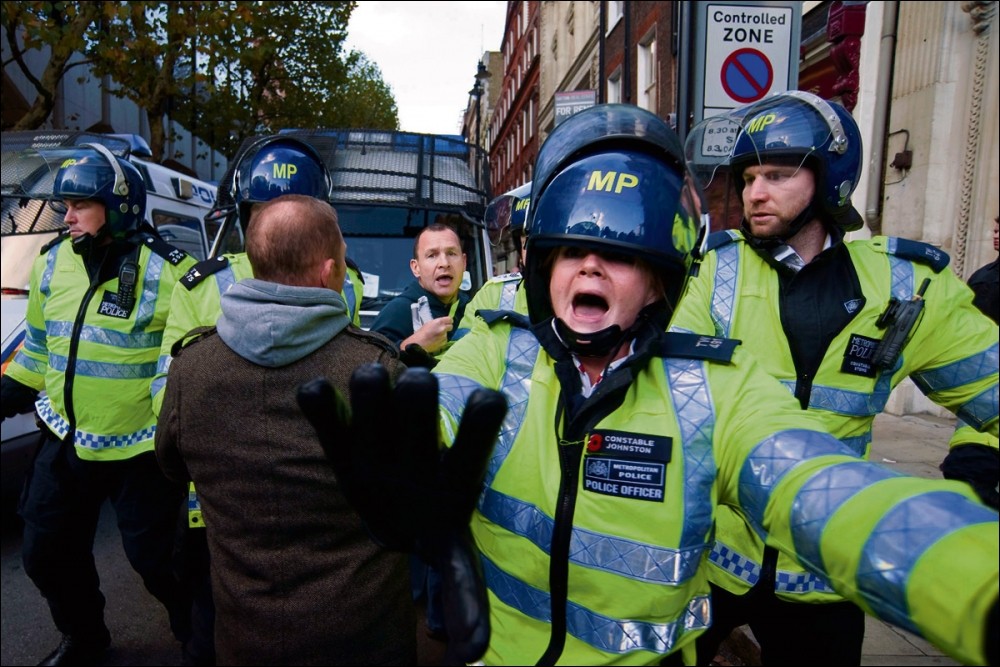
The European Court of Human Rights said, in November 2018, in a case brought against Putin’s Russia:
“Freedom of assembly as enshrined in Article 11 of the Convention [ of human rights] protects a demonstration that may annoy or cause offence to persons opposed to the ideas or claims that it is seeking to promote…”
Shift from people to police
As the Good Law Project pointed out back in March 2021, these measures “shift the balance of power from the people to the police – people will effectively be allowed to protest freely and without conditions only if the state machinery chooses to let them.” Moreover, the Bill imposes penalties where a person breaches a condition that they “ought to have known” existed!
The Bill also contains powers that make it easier for the police to clamp down on the Gypsy, Roma and Traveller (GRT) community, which suffers from the last bastion of “respectable” racism in polite society. It contains sweeping new powers to seize vehicles or mobile homes that are parked on land “without permission” and creates an individual criminal charge of a £2,500 fine or three months in prison. It also reduces the limit on vehicle numbers from six to one, making community life virtually impossible (Minority Rights Group International).
As if these provisions were not bad enough, the government wanted to go even further. The Lords voted against the government plans to:
- create a new offence of “locking on”, a tactic used by protesters to make it difficult to remove them, carrying with it a penalty of up to a year in prison. This tactic has been used by protesters since the Suffragettes chained themselves to railings!
- create a new offence of obstructing the construction or maintenance of major transport works, aimed at stopping protests against new roads or airports by environmental campaigners.
- make it an offence for a person to interfere with the use or operation of key national infrastructure, including airports, the road network, railways and newspaper printers. This is revenge for the actions taken by activists such as the Stanstead 15 to prevent migrants from being deported as well as the recent blockade of News International.
- allow police officers to stop and search a person or vehicle if it was suspected an offence was planned, such as causing serious disruption or obstructing major transport works
- allow police to stop and search anyone at a protest “without suspicion”
- allow individuals with a history of causing serious disruption to be banned by the courts from attending certain protests
Shameless
The final three measures were illegally used by police during the miners’ strike of 1984-85, but now the government shamelessly want to put the powers into law.
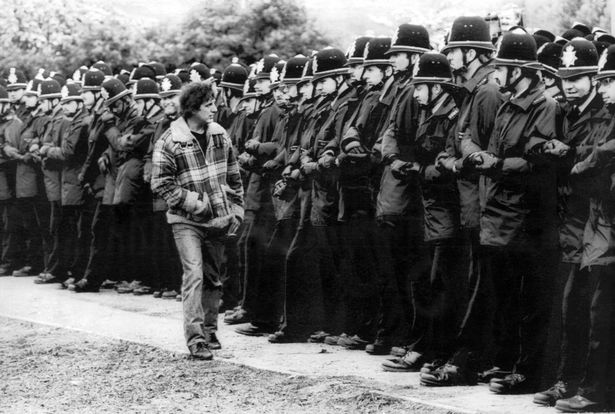
The Bill tried to ban “noisy” demonstrations that may lead to “intimidation or harassment of persons of reasonable firmness…” or if such persons “suffer serious unease, alarm or distress”, all these judgements being left to senior police officers, of course. Fortunately, an amendment to the Bill removed these powers.
Other amendments that were passed in the Lords include changes to:
- protect Parliament Square as a place to protest
- astonishingly, require police officers to tell the truth in public inquiries!
- restrict the imposition of tougher sentences for blocking a highway to major routes and motorways (rather than all roads). This was a “moderate” Labour amendment, rather than voting against the measure completely.
- scrap the Vagrancy Act 1824, which makes it a crime to beg as well as sleep rough
- make misogyny a hate crime by giving the courts the power to treat misogyny as an aggravating factor in any crime and increase sentences accordingly
Of course, it is no coincidence that the government is trying to introduce these oppressive laws and regulations at this particular time. It is all part of the ongoing class war waged by the ruling class. They are preparing an all-out attack on the living standards of working people, in the context of soaring energy costs, higher National Insurance, high inflation (especially food costs), limits to salary increases and brutal “hire and fire” tactics. They are expecting desperate struggles to resist such attacks, such as strikes, other industrial action and public protests.
Direct action
On top of that, they know that their unwillingness or inability under capitalism to halt or even ameliorate the impending global environmental catastrophe is bound to lead to an upsurge of furious people, especially the young, expressing their frustration and anger in direct action. For this reason, they are preparing their oppressive state machinery, ready for the coming battles.
It is important to be clear about the role of the police under a capitalist system. Of course, ordinary working people rely on the police to protect them from criminals such as murderers, robbers and violent attackers etc. No-one wants to see such people go uncaught or unpunished, although it is true to say that the police effectiveness in solving or prosecuting particular crimes, such as burglary, is very poor. Most people get little more than a crime number for their insurance. The record on dealing with rape and sexual assaults is widely recognised as totally inadequate, and there has been disturbing examples of sexism and misogyny among officers.
It is true that many people join the police for what they perceive as honourable reasons – to protect society, to help communities etc. Some officers put themselves in harm’s way to carry out their jobs and carry out acts of real heroism which should be applauded. Undoubtedly, however, other officers display authoritarian or arrogant attitudes and a dismissive, prejudiced, racist, and sometimes corrupt “canteen culture” can develop. Many who start off with good intentions can be gradually corrupted by this and the need to fit in with the bad attitudes of their colleagues: to be one of the team.
Protecting the status quo
But the attitude we should take towards the police should not primarily be determined by the personal characters of police officers. The main function of the police in any class society is to maintain “order” and that inevitably means protecting the status quo – the current system of class inequality that is central to the existence of capitalist society. This remains true in spite of the necessary role that they also perform in tackling plainly criminal behaviour. Even while playing this role, there is generally a clear anti-working-class and racist bias in terms of which categories of crimes are prioritised and how the law is enforced.
The police were founded in the early 19th century specifically in response to mass urbanisation and the increase in working-class militancy, such as the Chartists and other militant strikers and not just simple criminality. This is reflected in a widespread feeling of distrust of the police in some working-class communities, especially among Black and Asian communities or among migrants who have borne the brunt of anti-working class and racist policing. The same is true for many in the LGBT communities.
As long as this system is stacked against the interests of working people and in favour of the employers and the rich, the police will be called upon to preserve that system. They will, at crucial times, be thrown against any movement that threatens it. This could be seen in the way the police (and, allegedly, undercover soldiers) were used against the miners in the strike of 1984-5, where they became shock troops for maintaining the interests of capitalists, such as at the battle of Orgreave in June 1984 and in the literal occupation of many mining communities during the dispute.
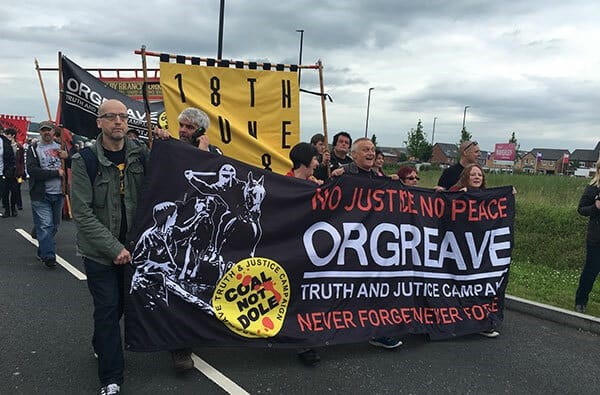
In Northern Ireland, the state actively infiltrated and collaborated with loyalist paramilitaries – even with members involved in murders – to try to defeat the IRA. And more and more examples are emerging of undercover police officers infiltrating socialist or environmental groups, including having deceitful sexual relationships with activists.
The state – not neutral
The state, and the forces it controls, cannot, in the last analysis, operate in a neutral manner. In any class-based society, the police and other armed forces will represent and protect the interest of the class that has economic and state power. In some particular situations, even social workers, civil servants or teachers can be dragged into playing that role. This is true even in societies which superficially have democratic systems, elections etc. Real power is still held by the economic elite and the top personnel of the state machine itself, and its armed forces.
This Police Crime, Sentences and Courts Bill, must be fought against – tooth and nail – by all sections of the labour movement, including every Labour MP. Anything less is a betrayal of all the struggles for democracy undertaken in the past.
We must demand full democratic control and accountability of police forces, right down to local community level and including all so-called ‘operational’ issues. We must fight against any extension of the oppressive functions of the police.
However, it is only when this whole class-based society is replaced by a one democratically controlled by the majority of working people themselves, that the police will genuinely be able to become a force which serves the whole community.

